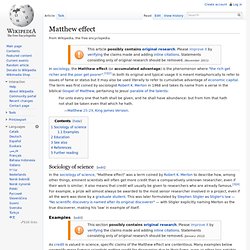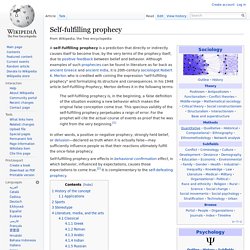

How to Design a Billion Dollar Company — Life Hacks for Business. Matthew effect. For unto every one that hath shall be given, and he shall have abundance: but from him that hath not shall be taken even that which he hath.

Sociology of science[edit] In the sociology of science, "Matthew effect" was a term coined by Robert K. Merton to describe how, among other things, eminent scientists will often get more credit than a comparatively unknown researcher, even if their work is similar; it also means that credit will usually be given to researchers who are already famous.[3][4] For example, a prize will almost always be awarded to the most senior researcher involved in a project, even if all the work was done by a graduate student. This was later formulated by Stephen Stigler as Stigler's law — "No scientific discovery is named after its original discoverer" — with Stigler explicitly naming Merton as the true discoverer, making his 'law' in example of itself.
Examples[edit] Education[edit] In the words of Stanovich: See also[edit] References[edit] Further reading[edit] Network effect. Diagram showing the network effect in a few simple phone networks.

The lines represent potential calls between phones. The classic example is the telephone. The more people who own telephones, the more valuable the telephone is to each owner. This creates a positive externality because a user may purchase a telephone without intending to create value for other users, but does so in any case. Online social networks work in the same way, with sites like Twitter, Facebook, and Google+ becoming more useful as more users join. The expression "network effect" is applied most commonly to positive network externalities as in the case of the telephone.
Over time, positive network effects can create a bandwagon effect as the network becomes more valuable and more people join, in a positive feedback loop. Origins[edit] Network effects were a central theme in the arguments of Theodore Vail, the first post patent president of Bell Telephone, in gaining a monopoly on US telephone services. Bandwagon effect. "Cultural phenomenon" redirects here.

For other cultural phenomena, see culture. A literal "bandwagon", whence the metaphor is derived. The bandwagon effect is a phenomenon whereby the rate of uptake of beliefs, ideas, fads and trends increases the more that they have already been adopted by others. In other words, the bandwagon effect is characterized by the probability of individual adoption increasing with respect to the proportion who have already done so.[1] As more people come to believe in something, others also "hop on the bandwagon" regardless of the underlying evidence. The tendency to follow the actions or beliefs of others can occur because individuals directly prefer to conform, or because individuals derive information from others.
Concept[edit] In layman’s terms the bandwagon effect refers to people doing certain things because other people are doing them, regardless of their own beliefs, which they may ignore or override. Self-fulfilling prophecy. A self-fulfilling prophecy is a prediction that directly or indirectly causes itself to become true, by the very terms of the prophecy itself, due to positive feedback between belief and behavior.

Although examples of such prophecies can be found in literature as far back as ancient Greece and ancient India, it is 20th-century sociologist Robert K. Merton who is credited with coining the expression "self-fulfilling prophecy" and formalizing its structure and consequences. In his 1948 article Self-Fulfilling Prophecy, Merton defines it in the following terms: The self-fulfilling prophecy is, in the beginning, a false definition of the situation evoking a new behavior which makes the original false conception come true. This specious validity of the self-fulfilling prophecy perpetuates a reign of error.
History of the concept[edit] Merton's concept of the self-fulfilling prophecy stems from[according to whom?] Merton took the concept a step further[according to whom?]